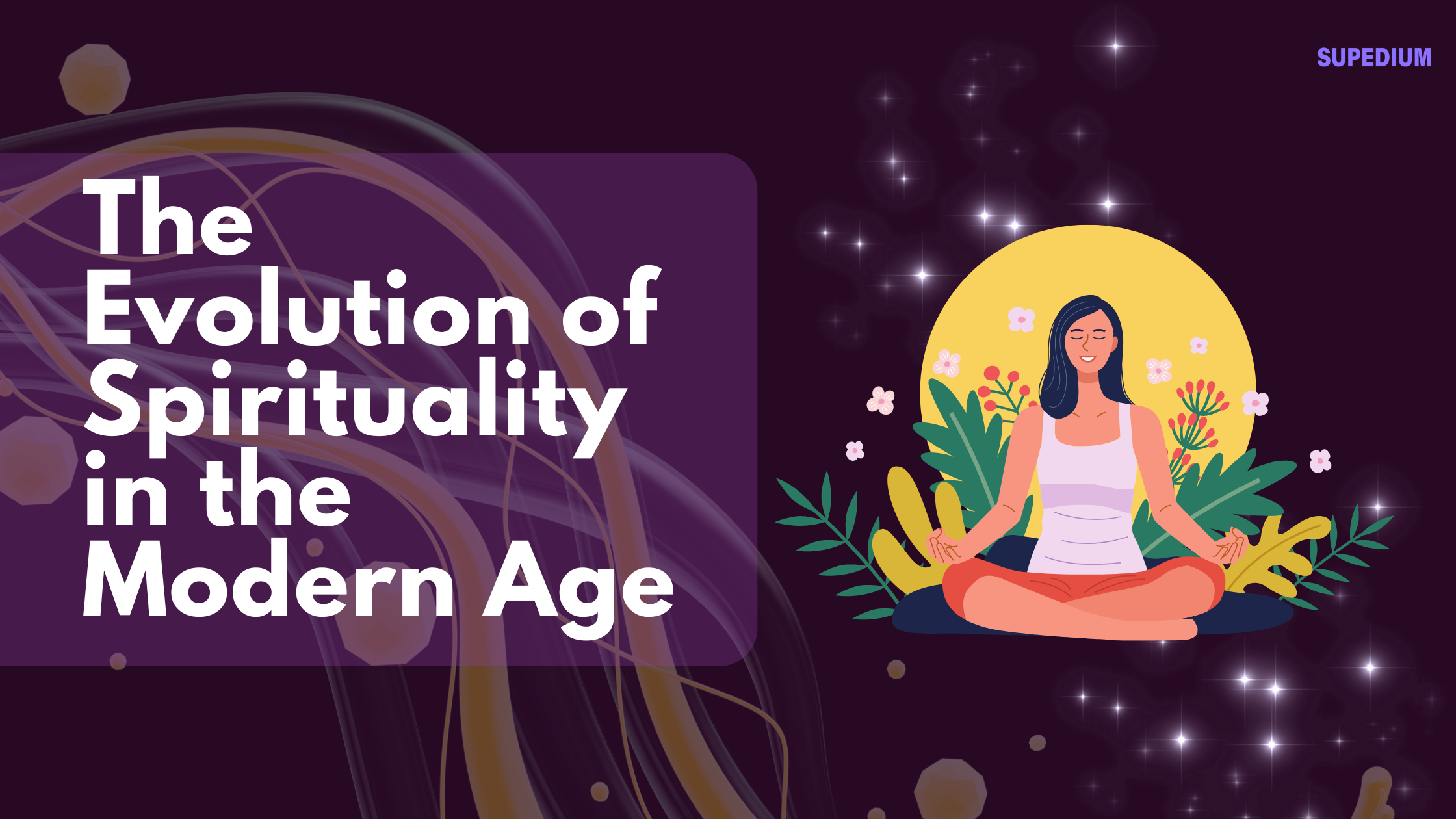Table of Contents
![]()
Introduction
Spirituality, often defined as a personal quest for meaning and connection beyond the material aspects of life, has undergone significant transformation over the centuries. While traditionally linked to organized religions, modern spirituality has expanded to encompass a broader range of practices and beliefs. Understanding this evolution is crucial as it reflects changing individual and societal values and highlights new ways people seek fulfillment and connection in the contemporary world.
Historical Context
Pre-Modern Spirituality
In ancient times, spirituality was deeply intertwined with religious institutions and practices. Early civilizations had their pantheons of gods and goddesses, rituals, and spiritual leaders. These systems provided frameworks for understanding the cosmos, human existence, and moral conduct. The practices were often communal, with religious rites and ceremonies being central to societal cohesion and cultural identity.
Transition to Modernity
The Enlightenment period of the 17th and 18th centuries marked a significant shift in spiritual thought. Emphasizing reason, science, and individualism, this era questioned traditional religious doctrines and promoted secularism. The Industrial Revolution further accelerated these changes by transforming societal structures, leading to urbanization and the decline of traditional communal practices. This period set the stage for a more individual-centered approach to spirituality.
Modern Spirituality: Key Characteristics
Rise of Individualism
In the modern age, spirituality has increasingly focused on individual experience and personal fulfillment. This shift reflects a broader cultural trend towards individualism, where personal beliefs and practices take precedence over institutional doctrines. People now often craft their own spiritual paths, drawing from various traditions and practices to suit their personal needs and experiences.
Pluralism and Eclecticism
One notable development in modern spirituality is the rise of pluralism and eclecticism. The New Age movement, which gained prominence in the late 20th century, exemplifies this trend by blending elements from different spiritual traditions, including Eastern philosophies, Western esotericism, and indigenous practices. This eclectic approach allows individuals to create personalized spiritual practices that resonate with their unique life experiences and beliefs.
Influence of Technology
Technology has also played a significant role in the evolution of spirituality. The internet and social media have facilitated the growth of online spiritual communities, making it easier for people to access spiritual resources and connect with like-minded individuals worldwide. Digital platforms offer everything from guided meditations to virtual spiritual workshops, expanding the reach and accessibility of spiritual practices.
Factors Influencing Spiritual Evolution
Social and Cultural Shifts
The increasing secularization of societies and changing family structures have influenced spiritual practices. As traditional religious institutions have lost some of their societal influence, individuals have sought alternative ways to explore and express their spirituality. This shift reflects broader cultural changes, including a move away from organized institutions towards more personal and individualized approaches.
Scientific and Philosophical Developments
Scientific and philosophical advancements have also impacted spirituality. Research in quantum physics and studies on consciousness have prompted new discussions about the nature of reality and human experience. Philosophical inquiries into the mind and consciousness have led to a reevaluation of spiritual concepts, integrating them with contemporary scientific understanding.
Globalization and Cross-Cultural Exchange
Globalization has facilitated the exchange of spiritual practices and ideas across cultures. Exposure to Eastern philosophies, such as Buddhism and Taoism, has influenced Western spiritual practices, leading to a richer and more diverse spiritual landscape. This cross-cultural exchange has enabled individuals to explore a wide range of spiritual traditions and incorporate elements from different cultures into their personal practices.
Contemporary Spiritual Practices
Mindfulness and Meditation
Mindfulness and meditation have become central to contemporary spiritual practices. Originally rooted in Eastern traditions, these practices have been widely adopted in the West for their mental health benefits. Scientific research supports the efficacy of mindfulness and meditation in reducing stress, enhancing emotional well-being, and improving overall quality of life.
Spiritual but Not Religious (SBNR)
The “Spiritual but Not Religious” (SBNR) movement represents a significant trend in modern spirituality. Individuals who identify as SBNR often reject traditional religious institutions while embracing a more personal and flexible approach to spirituality. This group values personal spiritual experiences over adherence to established doctrines and often incorporates diverse spiritual practices into their lives.
Alternative and Holistic Healing
Alternative and holistic healing practices have gained popularity as people seek complementary approaches to traditional medicine. Techniques such as energy healing, acupuncture, and aromatherapy are now widely practiced and integrated into mainstream wellness programs. These practices reflect a growing interest in holistic approaches to health that consider the interconnectedness of body, mind, and spirit.
Criticisms and Challenges
Commercialization of Spirituality
One of the challenges facing modern spirituality is its commercialization. Spiritual practices and beliefs are increasingly marketed as products, from self-help books to wellness retreats. This commercialization can undermine the authenticity and depth of spiritual practices, turning them into consumer goods rather than meaningful personal experiences.
Superficiality and Faddism
The rapid spread of spiritual trends and practices can lead to superficial engagement with spirituality. Some practices may become fads, lacking the depth and sustained commitment necessary for genuine spiritual growth. This trend can dilute the richness of spiritual traditions and reduce them to temporary trends.
Cultural Appropriation
The adoption of spiritual practices from other cultures raises issues of cultural appropriation. While cross-cultural exchange can be enriching, it is essential to approach other cultures’ spiritual practices with respect and sensitivity. Appropriation involves adopting elements of a culture without understanding or honoring their original context, which can be ethically problematic.
Future Directions
Emerging Trends
Looking ahead, spirituality is likely to continue evolving, with emerging trends including the integration of spiritual practices with modern science and technology. Advances in neuroscience and artificial intelligence may lead to new ways of understanding and experiencing spirituality. Additionally, new forms of spiritual expression may emerge as individuals continue to seek meaning in an ever-changing world.
Possible Challenges
The future of spirituality will also face challenges, such as balancing authenticity with global influences and navigating the complexities of a rapidly evolving world. As spirituality becomes increasingly diverse and personalized, it will be essential to maintain a sense of depth and integrity amidst the myriad of practices and beliefs.
Conclusion
The evolution of spirituality in the modern age reflects broader cultural, social, and technological changes. From its historical roots in organized religions to its contemporary manifestations in personal and eclectic practices, spirituality continues to adapt and transform. Understanding this evolution helps us appreciate the diverse ways people seek connection and meaning in today’s world and highlights the ongoing relevance of spirituality in addressing fundamental human needs and values.
Share This





Be the first to comment